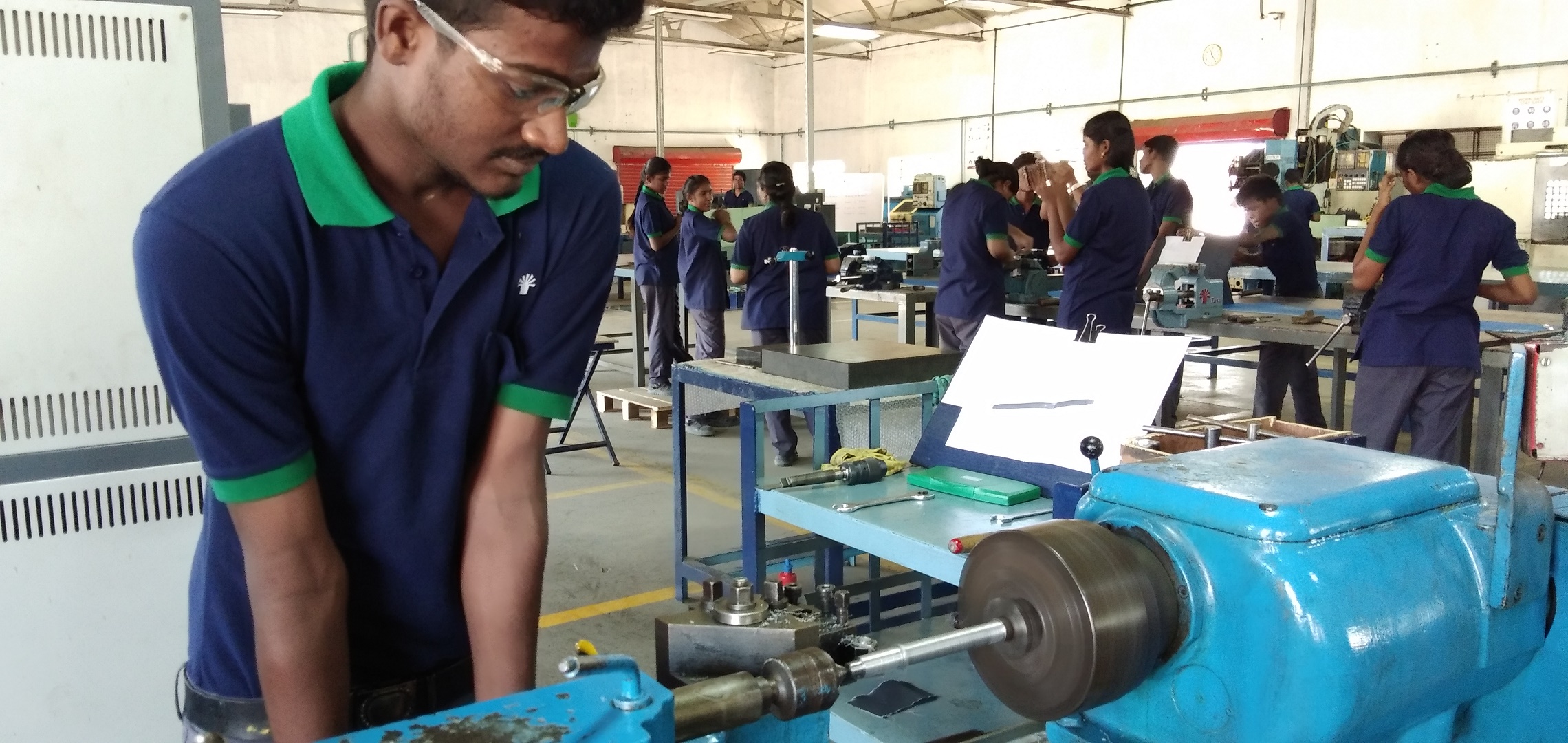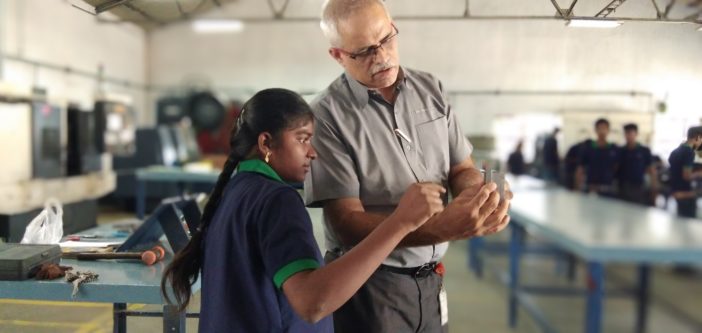Engineering graduates’ employability: One side of the coin
- “A huge percentage of engineering graduates are not employable;” says a headline.
- Parents are worried that their dream ‘to help their children lead a better life than they did’ may not materialize.
- Students are concerned that even after 4 to 5 years of hardship, they still have to ‘sit on the bench’, waiting for a placement.
Engineering graduates’ employability: Another side of the coin
- Meanwhile, industry is constantly asking for skilled workforce.
- We do not find competent fresh engineers that can be readily deployed on the shop-floor.
- Some large organizations bridge this gap by training their own workforce either post- employment, or through Apprenticeship Programmes.
Engineering Education in India, at present
For a long time, industry has been insisting that the educational institutions should develop curriculum suitable to industry’s present needs; and equip students with not only book knowledge, but also with practical skills. Nevertheless, most of the colleges have stuck to delivering mostly theoretical lectures all the time. Expensive equipment are often merely demonstrated, and kept unused due to the fear that students might damage them. More woeful is the fact that most of the staff is not trained to use these equipments.
 Our Experience as an Employer: As a leading foundry-to-finished-goods company, we employ hundreds of diploma and graduate engineers every year. Almost all of them have to be re-trained to develop practical Skills to read a drawing or use an Analog Vernier Caliper. Basic skills that need to be taught in the polytechnics and colleges are lacking. Much of the theoretical knowledge they get before graduation, dies without being used, and thus becomes irrelevant.
Our Experience as an Employer: As a leading foundry-to-finished-goods company, we employ hundreds of diploma and graduate engineers every year. Almost all of them have to be re-trained to develop practical Skills to read a drawing or use an Analog Vernier Caliper. Basic skills that need to be taught in the polytechnics and colleges are lacking. Much of the theoretical knowledge they get before graduation, dies without being used, and thus becomes irrelevant.
Industry has been insisting that the educational institutions should develop curriculum suitable to industry’s present needs; and equip students with not only book knowledge, but also with practical skills. Vocational Swiss Programme creates world-class graduates that are competent, confident, and care for community at large; because of the skill, knowledge, and attitude that they gain through the three years of training.
Engineering Education in Europe
European countries like Switzerland, Germany, and Denmark have a model of education which emphasizes skill development ‘from the start’. Most students start with Vocational education programmes where they develop practical skills, attend college, find employment during this period, and study further, even up to Doctoral level if they wish to.
Even as they finish schooling, young students are already well-versed in how to bake bread, machine components, nurse patients, code applications; and thus can start to make a living. Advantages of these skills are immediately transferable to an employer.
 Reversal of Pyramid in India: Our traditional system has reversed this pyramid model completely, and has become Top heavy. Our quest to hold hands and take our children all the way to the top has left them with no base to stand on. If they have no employment, we throw more money into this pool by letting them study Masters and MBAs, ‘instead of sitting idle’. We want them to go from school kids to managers, with nothing in between.
Reversal of Pyramid in India: Our traditional system has reversed this pyramid model completely, and has become Top heavy. Our quest to hold hands and take our children all the way to the top has left them with no base to stand on. If they have no employment, we throw more money into this pool by letting them study Masters and MBAs, ‘instead of sitting idle’. We want them to go from school kids to managers, with nothing in between.
Vocational Programmes in many European countries are defined, designed, and deployed with active participation from the Industry Associations themselves. Their graduates find ready employment because the industry is the body which directs as to what skills they must possess.
This type of Industry-Education Partnership is called a twin-track programme – one track ensures that Academic goals, as defined by the industry, are met; and the second track of industrial internship ensures a competent skilled workforce, and employment.
This system has worked wonders in many countries in Europe. Even Americans and British are also adapting it into their system. Even in India, Apprentices and Skill Diploma-holders have very low unemployment.
At Texmo Industries, Coimbatore
Texmo Industries has adopted and implemented this twin-track system where a Swiss company defines the curriculum and quality of delivery, and Texmo provides practical skills and employment. Graduates will not only have manufacturing skills as defined to Swiss standards, but will also be trained in the pump industry processes: from Foundry, Core- making, Pattern-making; through to Machining, Winding, Assembly, and Testing.
Such is the demand for this programme that we recruited 50 students for our 3rd batch within 10 days from initiating the application process. We believe this is Industrial Testimony to the strong demand for the Swiss model of Skill-based education, and the trust on Texmo to deliver it.
We expect this programme to create world-class Graduates that are competent, confident, and care for community at large; because of the skill, knowledge, and attitude that they gain through the three years of training. We expect them (i) to provide creative solutions to our problems, and (ii) to think critically without fear.
Our industry is going through rapid changes and advancement as it rightly should.
We believe that this Swiss way of twin-track Skill Education is what our country needs. We believe in its success. We are proud to take this initiative.
About the author: Kamesh Sundaram (Principal Texmo Industries) Coimbatore – 641 029. Email : kms@texmo.net
This article is re-published by the guest author with permission from the Foundry Magazine.
Disclaimer: The content (text, pictures, videos, slideshows and audio) are provided and approved for publishing by the client who is featured in this article. National Skills Network – NSN is not responsible for any copyright or related issues with any type of content. Also, NSN does not subscribe to the views and opinions expressed in the article.












